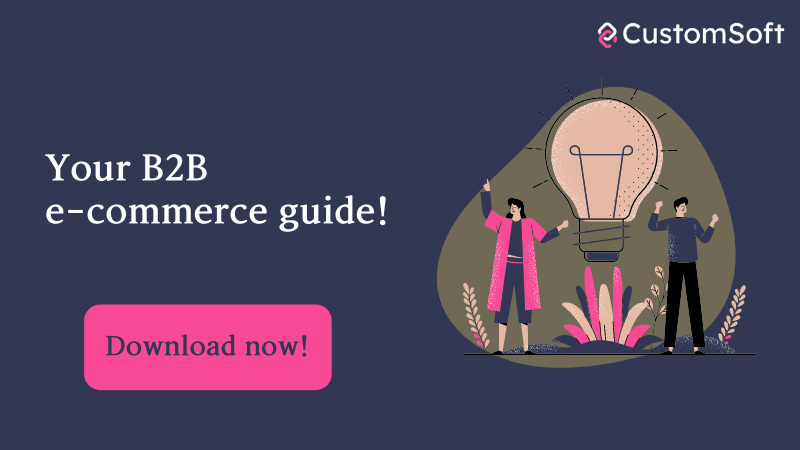A B2B marketplace is a type of e-commerce platform that brings together B2B sellers and buyers and allows them to have online transactions in one place. This platform is addressed only to legal entities, unlike B2C platforms, where customers are individuals.
The impact of COVID-19 was felt not only on offline businesses, but also on online ones. B2B marketplaces were already a significant growth factor for B2B businesses, but now their importance is even greater. Most traditional sales channels – sending and processing orders by phone, e-mail and sales agents – are now slowed down or closed altogether, as many companies have limited their work in offices and moved to a remote work environment.
Digitization has been adopted both at the organizational level and at the industry level.
In just a few months, the COVID-19 crisis has brought the equivalent of many years of change in the way companies in all sectors operate. Many of these changes could be here in the long run. At the beginning of this crisis, many companies were not prepared to face the new restrictions. After restrictions were imposed on restaurants, shops, theaters and other companies, many of them found ways to cope. In order to remain competitive in this new business environment, new strategies are needed.

As the current trend continues, this is a huge opportunity for B2B distributors and manufacturers to adopt the marketplace model to be one step ahead of the competition.
Part I: Fundamentals of the B2B marketplace
How does a B2B marketplace work?
The abbreviation “B2B” means “business to business” and is a business model in which companies provide services or provide products to other companies, rather than to individual consumers.
Although B2B platforms work in a similar way to B2C platforms, there are significant differences in behavior between their customers. B2B companies have a completely different target audience and offer the products, raw materials, services that other companies need to function, grow and make a profit.
The B2B customer is a customer with experience in the field, whose sales cycle is much longer than in the case of a B2C customer. In the case of such a customer, the purchase is more complex and there may be several stakeholders. Also, in B2B the traded volumes are very large, which makes it possible to customize prices according to the customer.

In a marketplace, it is important that each customer in the B2B system has their “own” part of the application – a place where relevant information is available to the customer. This information is represented by general data about the contract and the clients’ conditions, price lists with prices agreed after negotiation, lists by categories of goods, delivery or pick-up dates, transport supervision (from the date of the packing order to the final delivery point ), returns and complaints, as well as the accompanying documentation, such as receipts, invoices, approvals, etc.
In addition, customers can expect to be able to request the purchase and delivery of goods that the seller does not currently have in stock. This means that it is necessary not only to have this functionality in the application but also to prepare the purchase and sale process that can support it, in addition to the accompanying elements – providing information about the purchase and delivery data, possible quantities, partial delivery possibilities, along with the appropriate accompanying documentation and more.
There are different types of B2B marketplaces depending on the structure of the parties involved, and other factors.
Types of B2B marketplaces:
- based on business type: Vertical and Horizontal.
In the case of Vertical marketplaces, the traded products and services belong to a single segment. Vertical marketplaces allow trade only between segments of a particular industry. Examples of industries: pharma, automotive, etc.
In the case of Horizontal marketplaces, transactions take place between different industries, and they bring together businesses from different segments. For example, a B2B marketplace can connect construction companies with furniture and decoration companies.
- based on the business model: for products, services and hybrid.
Product marketplaces connect companies to supply products. Example: a construction company and an equipment supplier.
Service marketplaces connect service companies. Example: a construction company and a human resources company.
Hybrid marketplaces are a more complex type, as they involve both B2B and B2C relationships.
In Romania, CustomSoft had the opportunity to be part of the project through which Veranda Mall became the first mall in Romania to launch its own online store through a marketplace.
See here more details about the Veranda Mall project.
- one-to-many and multi-to-many B2B marketplaces.
One-to-many marketplaces are managed by a single procurement company, for example, an automobile company creates a marketplace where suppliers receive access and can submit quotes and offers for what they request.
Many-to-many marketplaces are managed by a third party, and buyers and suppliers are different entities, for example, Alibaba.
- local and global B2B marketplaces.
The difference between these is represented by the target audience. Local marketplaces provide products and services only on the local market, and global ones have no geographical restrictions.
- based on commission.
For each successfully completed order that a seller receives from the platform, they pay a percentage as a commission to the marketplace operators. The commissions may be different depending on the type of products, the category of products, the volume of orders, the value of the basket, and other variables.
- subscription-based.
The marketplace charges a membership fee to sellers to allow them to use their business platform. This model is more common in giant B2B commercial markets with many repeat customers.
- based on listing fee.
Sellers must pay a listing fee to post a product for sale.

Part II: The advantages of the B2B marketplace
Why would a company choose a B2B marketplace? Benefits:
- the sales process is simplified;
- costs decrease;
- the platform interface is intuitive, easy to use regardless of the technical level of the person using it;
- payments are made using secure instruments;
- integrations with various other software;
- sales optimization;
- buyers are offered several options;
- expanding the network of B2B partners.
There are different types of B2B platforms, each with different facilities. Regardless of the business model, B2B marketplaces continue to enter the market at a rapid pace, and competition is growing for both buyers and sellers. The adoption of B2B marketplaces is a transformation of the way companies buy and sell products and services globally.
Some functionalities of a marketplace:
- single easy-to-use dashboard;
- several payment providers already integrated into the platform;
- easy registration of new sellers on the platform;
- the possibility to create subscriptions and commissions;
- multiple promotion and payment options.
E-commerce is a necessity for conducting business nowadays because otherwise you will limit your growth potential. If you are not fully convinced yet, we have prepared an article that discusses 5 e-commerce advantages for retailers.
Are you ready to take your company to the next level? We can help you! Fill in the form and a consultant will contact you as soon as possible.

